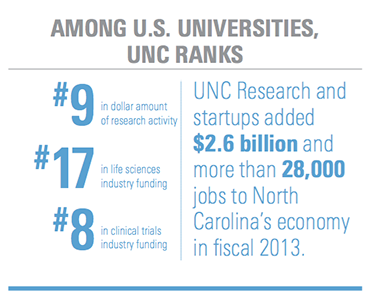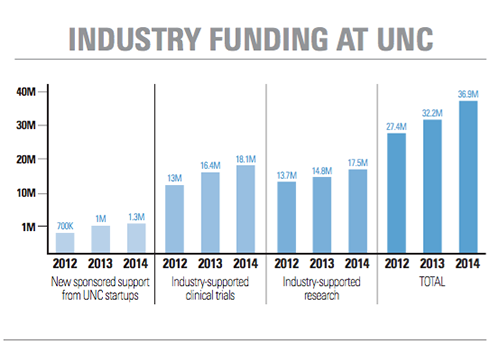UNC-Chapel Hill pairs research expertise with industry needs
A shorter road from ideas to the marketplace

In 2015, UNC-Chapel Hill joined the ranks of the top 10 U.S. research universities, thanks to a diverse portfolio of nearly $1 billion annually. Global industry leaders like GlaxoSmithKline, Cisco Systems, and Eastman Chemical have taken notice and forged novel partnerships with UNC scientists.
Faculty and students come to UNC for its global reputation, cutting-edge research, and culture of collaboration. That atmosphere extends off-campus to private companies who seek expertise to bring down diseases and develop solutions to complex technological challenges. Industry funding for UNC research jumped 14% from 2013 to 2014, reaching $36.9 million, a number UNC aims to rapidly increase.
To end an evil disease
Since UNC Hospitals treated its first AIDS patient in 1981, the university has been a leader in HIV research. In 2011, a global, UNC-led study demonstrated that early treatment with antiretrovirals can massively reduce the spread of HIV. UNC’s preeminence in HIV research led to the announcement in 2015 of an unprecedented UNC partnership with GlaxoSmithKline to end the disease once and for all.
The new HIV Cure Center at UNC will focus exclusively on a cure for HIV/AIDS. Qura Therapeutics, jointly owned by the university and GSK, will handle the partnership’s business and intellectual property.
GSK will invest $20 million each year and embed a team of researchers at the center. UNC will contribute world-class lab space, access to patients and funding, and faculty research expertise. "This first of its kind, joint-ownership model is a novel approach toward finding a cure," says Chancellor Carol L. Folt. "We hope it serves as an invitation to the world’s best researchers and scientists."
A research partner for N.C. business

As UNC’s research rankings have climbed, it has strengthened relationships with N.C. companies such as Quintiles and helped draw businesses like Eastman Chemical to the state. UNC routinely partners with Quintiles, sharing clinical trials, fellowships, and knowledge for best practices. UNC’s chemistry, physics, and applied physical sciences departments work closely with Eastman, which has funded more than $2 million of research at UNC.
Later this summer, UNC will launch a new Office of Industry Contracting. This central resource will reduce contract cycle times and simplify the process for more industry partners to connect with UNC researchers.
UNC specializes in training students in fields central to North Carolina’s economy, such as computer science, pharmacy, biotechnology and nanoscience. Through the National Consortium for Data Science, organized by UNC’s Renaissance Computing Institute with partners including Cisco Systems and IBM, Carolina helps tackle foundational challenges in big data management and connects companies needing talent with students trained in the field.
A virtuous cycle of university startups
UNC-Chapel Hill has spun out over 150 businesses active in North Carolina. Startups emerging from its research become magnets that attract additional funding to the state from private investors and federal agencies.

Chemistry professor Mike Ramsey’s startup 908 Devices, for example, just secured an $11.5 million grant from the Defense Threat Reduction Agency to develop chemical- detection devices and will subcontract research at UNC. Last fall, Parion Sciences, founded by Professor of Medicine Rick Boucher, won a $7.7 million grant, shared with UNC to develop treatments that help lung disease patients breathe easier. UNC’s Joe DeSimone, with startups including Liquidia Technologies and Carbon3D, has been a leader in reinvesting in UNC research.
Quicker clinical trials for faster cures
UNC advances clinical trials for industry sponsors such as Quintiles by providing support at every stage. UNC has developed processes that ensure integrity and eliminate redundancy for multi-site studies. It leverages core strength in big data to seek out patients meeting study criteria. Once a study is underway, UNC's Office of Clinical Trials helps ensure the highest standards of quality are used to produce accurate results. UNC has expanded its clinical trials infrastructure, adding positions to support patient recruitment, regulatory services, compliance and best-practices training for study management.
"When a sponsor does work at UNC, our hope is that they’ll get all the patients that they want and the data will be of very high quality. But most importantly, they'll have access to investigators and study coordinators with a great deal of experience in the disease," says John Buse, principal investigator at the North Carolina Translational and Clinical Sciences (NC TraCS) Institute — the integrated hub of the Clinical and Translational Science Awards (CTSA) Program at UNC.
Article originally published in Business North Carolina.
- Created on .